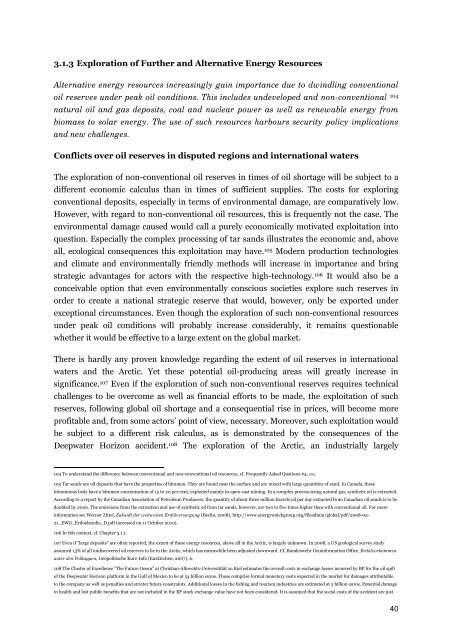PEAK OIL
PEAK OIL
PEAK OIL
Create successful ePaper yourself
Turn your PDF publications into a flip-book with our unique Google optimized e-Paper software.
3.1.3 Exploration of Further and Alternative Energy Resources<br />
Alternative energy resources increasingly gain importance due to dwindling conventional<br />
oil reserves under peak oil conditions. This includes undeveloped and non-conventional 104<br />
natural oil and gas deposits, coal and nuclear power as well as renewable energy from<br />
biomass to solar energy. The use of such resources harbours security policy implications<br />
and new challenges.<br />
Conflicts over oil reserves in disputed regions and international waters<br />
The exploration of non-conventional oil reserves in times of oil shortage will be subject to a<br />
different economic calculus than in times of sufficient supplies. The costs for exploring<br />
conventional deposits, especially in terms of environmental damage, are comparatively low.<br />
However, with regard to non-conventional oil resources, this is frequently not the case. The<br />
environmental damage caused would call a purely economically motivated exploitation into<br />
question. Especially the complex processing of tar sands illustrates the economic and, above<br />
all, ecological consequences this exploitation may have. 105 Modern production technologies<br />
and climate and environmentally friendly methods will increase in importance and bring<br />
strategic advantages for actors with the respective high-technology. 106 It would also be a<br />
conceivable option that even environmentally conscious societies explore such reserves in<br />
order to create a national strategic reserve that would, however, only be exported under<br />
exceptional circumstances. Even though the exploration of such non-conventional resources<br />
under peak oil conditions will probably increase considerably, it remains questionable<br />
whether it would be effective to a large extent on the global market.<br />
There is hardly any proven knowledge regarding the extent of oil reserves in international<br />
waters and the Arctic. Yet these potential oil-producing areas will greatly increase in<br />
significance. 107 Even if the exploration of such non-conventional reserves requires technical<br />
challenges to be overcome as well as financial efforts to be made, the exploitation of such<br />
reserves, following global oil shortage and a consequential rise in prices, will become more<br />
profitable and, from some actors’ point of view, necessary. Moreover, such exploitation would<br />
be subject to a different risk calculus, as is demonstrated by the consequences of the<br />
Deepwater Horizon accident. 108 The exploration of the Arctic, an industrially largely<br />
104 To understand the difference between conventional and non-conventional oil resources, cf. Frequently Asked Qustions #4, 111.<br />
105 Tar sands are oil deposits that have the properties of bitumen. They are found near the surface and are mixed with large quantities of sand. In Canada, these<br />
bituminous beds have a bitumen concentration of 15 to 20 per cent, exploited mainly in open-cast mining. In a complex process using natural gas, synthetic oil is extracted.<br />
According to a report by the Canadian Association of Petroleum Producers, the quantity of about three million barrels oil per day extracted from Canadian oil sands is to be<br />
doubled by 2020. The emissions from the extraction and use of synthetic oil from tar sands, however, are two to five times higher than with conventional oil. For more<br />
information see Werner Zittel, Zukunft der weltweiten Erdölversorgung (Berlin, 2008), http://www.energywatchgroup.org/fileadmin/global/pdf/2008-05-<br />
21_EWG_Erdoelstudie_D.pdf (accessed on 11 October 2010).<br />
106 In this context, cf. Chapter 3.1.1.<br />
107 Even if "large deposits" are often reported, the extent of these energy resources, above all in the Arctic, is largely unknown. In 2008, a US geological survey study<br />
assumed 13% of all undiscovered oil reserves to lie in the Arctic, which has meanwhile been adjusted downward. Cf. Bundeswehr Geoinformation Office, Erdölvorkommen<br />
unter den Polkappen, Geopolitische Kurz-Info (Euskirchen, 2007), 6.<br />
108 The Cluster of Excellence "The Future Ocean" at Christian-Albrechts-Universitität zu Kiel estimates the overall costs in exchange losses incurred by BP for the oil spill<br />
of the Deepwater Horizon platform in the Gulf of Mexico to be at 54 billion euros. These comprise formal monetary costs expected in the market for damages attributable<br />
to the company as well as penalties and stricter future constraints. Additional losses in the fishing and tourism industries are estimated at 5 billion euros. Potential damage<br />
to health and lost public benefits that are not included in the BP stock exchange value have not been considered. It is assumed that the social costs of the accident are just<br />
40


